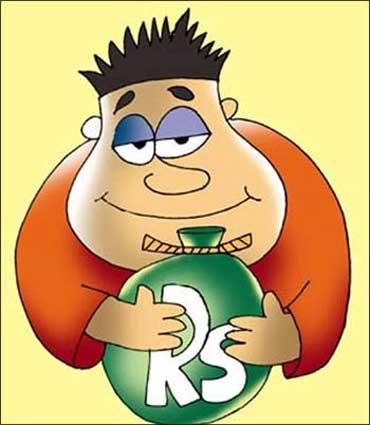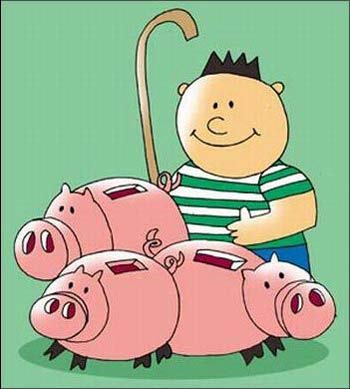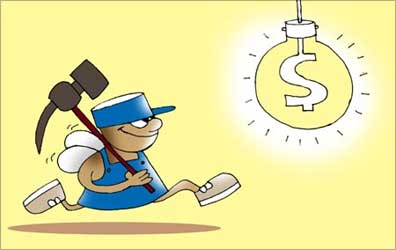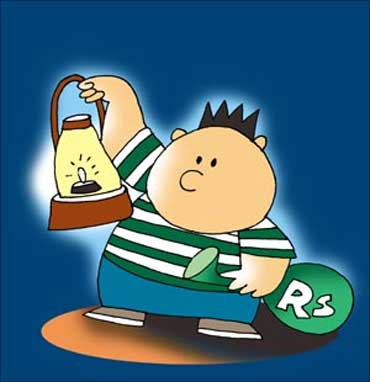Photographs: Uttam Ghosh/Rediff.com Sandeep Shanbhag
A couple of years back, Dilip Kunte stayed away from investing in the markets since it was too high. Now, he finds the market too low to invest.
For more than two years, while he waited for an ideal opportunity, he kept his funds idle. However, ideal opportunities are evident only on hindsight. While Kunte waited, the market has almost doubled from a low of 8,198 points, it had reached on March 5, 2009.
Ideally, one should never look at short-term returns from the equity market. Over the long term, the compounding effect kicks in.
In the book, Once upon a Wall Street, Peter Lynch, one of the most successful of mutual fund managers there, narrates a story.
. . .
Why early birds end up RICHER
Photographs: Uttam Ghosh/Rediff.com
"Consider the Indians of Manhattan, who in 1625 sold all their real estate to a group of immigrants for $24 in trinkets and beads. For 362 years, the Indians have been the subjects of cruel jokes because of it - but it turns out that they may have made a better deal than the buyers who got the island."
"At eight per cent interest on $24 (Note: Let's suspend our disbelief and assume they converted the trinkets to cash), compounded over all those years, the Indians would have built up a net worth just short $30 trillion, while the latest tax records from the Borough of Manhattan show the real estate to be worth only $28.1 billion. "
Give Manhattan the benefit of doubt: That $28.1 billion is the assessed value, and for all anybody knows, it may be worth twice that on the open market. So, Manhattan's worth is $56.2 billion. Either way, the Indians could be ahead by $29 trillion and change.
This little story shows you the power of compounding and the fact that the earlier you start investing, the better it gets.
. . .
Why early birds end up RICHER
Photographs: Uttam Ghosh/Rediff.com
Illustration
Let's try and understand this through an example of two friends, Ravi and Kirti. Both start working at the same time, at the age of 23. Ravi starts saving when he turns 25 and invests Rs 50,000 every year.
Assuming he earns a return of 10 per cent every year, at the end of 10 years, Ravi is able to accumulate Rs 8.77 lakh (Rs 877,000).
After this, due to financial constraints, he is not able to invest any more money. At the same time, he does not touch the capital he has already accumulated, hoping to live off it when he retires.
Therefore, he lets the Rs 8.77 lakh grow and assuming that it continues to earn a return of 10 per cent every year, he would have been able to accumulate around Rs 95 lakh (Rs 9.5 million) by the time he turns 60.
So the Rs 5 lakh (Rs 50,000 x 10 years) he had invested in the first 10 years has grown to Rs 95 lakh. This even though he stopped investing Rs 50,000 every year after the first 10 years.
. . .
Why early birds end up RICHER
Photographs: Uttam Ghosh/Rediff.com
Now let's take the case of Kirti. During the first few years of his employment, Kirti enjoyed life and spent money on other expenses, rather than invest regularly.
At the age of 35, reality suddenly dawns on him and he starts investing Rs 50,000 every year. He invests this amount every year till he turns 60, that is for 25 years.
Assuming he also earns a return of 10 per cent per year on his investments, at the end Kirti would have managed to accumulate Rs 54.1 lakh (Rs 5.41 million).
Even after investing Rs 50,000 regularly for 25 five years, he has accumulated Rs 41 lakh (Rs 4.1 million) less in comparison to Ravi, though the latter invested only Rs 5 lakh over the 10 years he invested.
. . .
Why early birds end up RICHER
Photographs: Uttam Ghosh/Rediff.com
In comparison, Kirti, over the 25 years, has invested Rs 12.5 lakh (Rs 50,000 x 25 years). Even by investing two and a half times more than Ravi, Kirti's corpus is 43 per cent less.
This happened because Ravi started investing earlier. This allowed the money to compound for a greater period of time.
Also, as the corpus grows, the impact of compounding is greater. Ravi accumulated Rs 8.77 lakh after 10 years and then he stopped investing Rs . 50,000 every year, allowing the accumulated corpus to compound for 20 years more.
Let's say he had allowed the corpus to compound for only 20 years more, till he turned 55. If the corpus had earned a return of 10 per cent every year, then at the end, Ravi would have accumulated around Rs 59 lakh (Rs 5.9 million).
. . .
Why early birds end up RICHER
Photographs: Uttam Ghosh/Rediff.com
By choosing to let his investment run for five years more, Ravi managed to accumulate Rs 45 lakh (Rs 4.5 million) more.
Real life
In terms of a practical example, take HDFC Equity Fund. The five-year return is around 13 per cent yearly.
On the other hand, from inception (December 1994), the fund has returned as much as 21 per cent yearly. Now, had an investor invested, say, Rs 50,000 five years before, the investment would have grown to just around Rs 91,000.
However, had the investment been made at inception (allowing the money to compound over a greater period of time), the investment would have grown over 24 times, to around Rs 12 lakh (Rs 1.2 million)!
It's never too early, nor too late, to begin investing. Or, to put it differently, better late than later.
The writer is director, Wonderland Consultants.








article